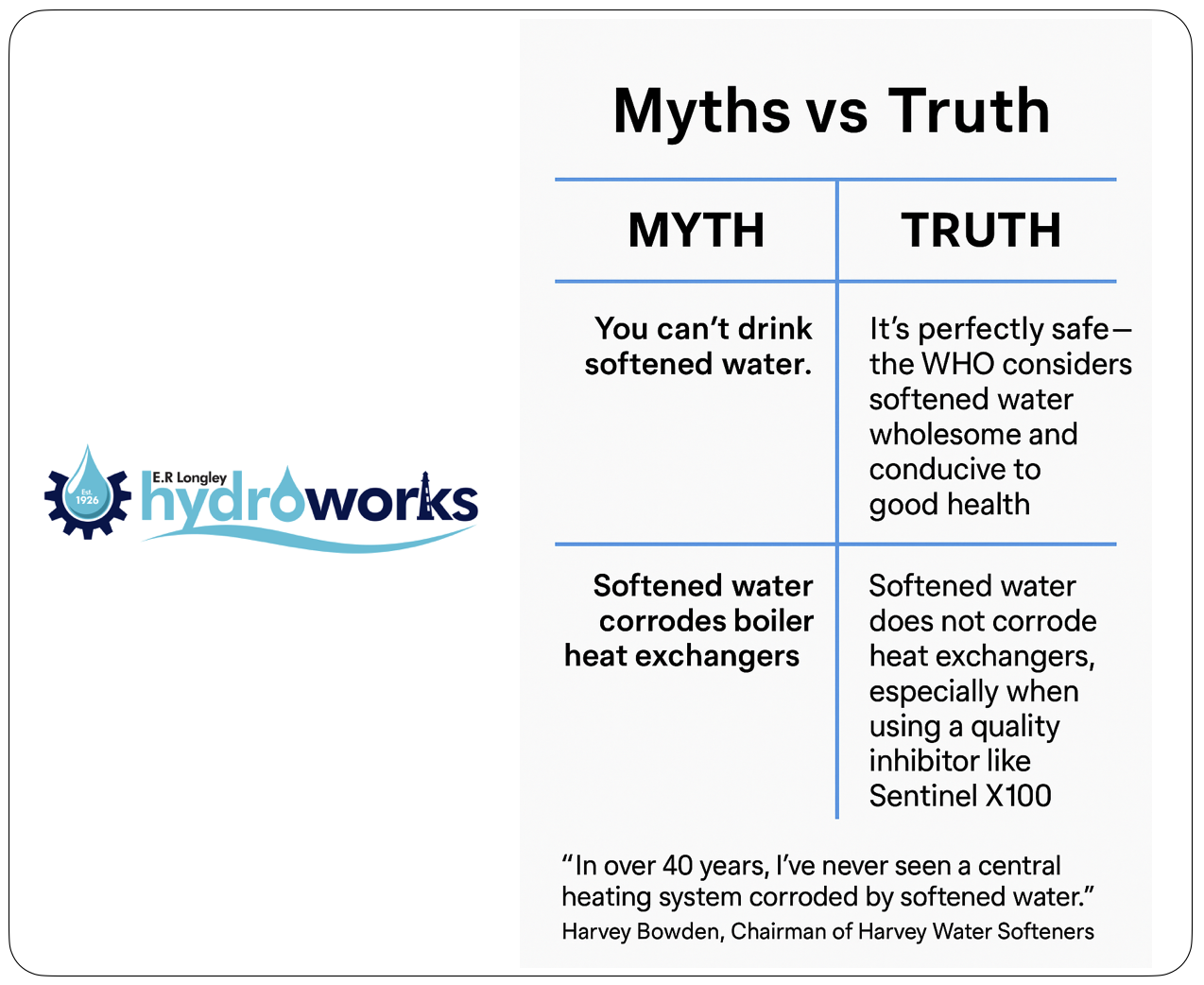Can you put softened water into a boiler?
Short Answer: Yes, you absolutely can!
In my 26+ years in this industry, two myths have caused more confusion than any others:
“You can’t drink softened water.”
Totally untrue. It’s perfectly safe, and even the World Health Organisation (WHO) confirms it’s wholesome and conducive to good health. I’ve written a full page about this here:
Can you safely drink softened water?
“Softened water corrodes boiler heat exchangers.”
Also false. This idea mainly stems from a few boiler manufacturers, like Worcester Bosch and Ideal, who have voiced caution - but only in the UK. Their advice can even change depending on which country you’re in! So, if you have one of their boilers, we tell you here how not to fall foul of their advice. Most other manufacturers, however, are very pro softened water.

So what are the real facts about boilers?
Softened water does not corrode aluminium heat exchangers - and extra peace-of-mind can be obtained when paired with a quality corrosion inhibitor like Sentinel X100 which your heating engineer can arrange for you.
In fact, if you’re using a British-made Harvey Minimax softener, the manufacturer guarantees your boiler won’t suffer corrosion when used with Sentinel X100.
As of 2016, Worcester Bosch - after 18 years - has still never shown the industry a heat exchanger corroded by softened water.
Most of the confusion stems from mixed messages between boiler manufacturers, inhibitor brands, certifying bodies, and the water treatment industry. Meanwhile, in countries like Germany, softened water is recommended, and corrosion inhibitors are not. Strange, huh!
Important distinction: Naturally soft vs artificially softened
-
Naturally soft water (like in parts of Scotland, Wales or Cornwall) can be corrosive due to low mineral content and low pH.
-
Artificially softened water (produced by a water softener) is not corrosive, and no evidence has shown it to cause harm to boiler systems.
What do the experts say?
Harvey Bowden, Chairman of Harvey Water Softeners, put it plainly:
- “In over 40 years, I’ve never seen a central heating system corroded by softened water. Worcester Bosch hasn’t shown one either. Use Sentinel X100, and you’re protected.”
and went further:
- "I have never seen any evidence of a central heating system corroded because of softened water and I’ve been here for over 40 years. I have never heard from anyone who has experienced corrosion from softened water. Worcester Bosch, after 18 years, has never been able to show me a heat exchanger corroded by softened water.
I have heard from many of you that say they never use corrosion inhibitors and they still don’t get any corrosion of aluminium or any other metal.
All central heating systems should be protected by using an inhibitor designed for the purpose. The current British Standard 7595:2006 categorically states that you can use softened water with the correct inhibitor type. There is an inhibitor on the market specifically designed to work with softened water, Sentinel X100. -So the common-sense position is this:
Use softened water in your central heating system and enjoy its benefits. Use Sentinel X100 as your corrosion inhibitor.
If you are installing one of my softeners, such as one from the Minimax range sold by Hydroworks, you can download a letter from me guaranteeing your aluminium heat exchanger."
A Small Caveat: Check Your Boiler Manufacturer’s Guidelines
These days, most boiler manufacturers are happy for softened water to be used in the heating (primary) circuit. But a few still take a more cautious approach. Two that sometimes raise questions are Worcester Bosch and, occasionally, Ideal Standard - although in our experience, Ideal’s advice can vary depending on who you speak to.
That said, most of our customers now soften the entire home, including the water that fills the central heating circuit. If they prefer not to, there are two possible options:
-
Installing a separate hard water filling loop (though this is extremely rare in our experience)
-
Or temporarily bypassing the softener when topping up the heating circuit (again, rarely needed)
If you have a Harvey Minimax water softener, and your heating engineer is doing the job to professional standards - using Sentinel X100 inhibitor in the heating circuit - then you’ll be pleased to know that Harvey issues a written guarantee to protect your boiler.
Details of that guarantee are available further down on this page.
But can you still get corrosion of a central heating system?
Yes—corrosion is still a very real risk, no matter what kind of water you use.
Even if your home has a water softener (which is fantastic at reducing scale), central heating systems are filled with metal - steel, copper, aluminium - and water. That combination always carries a risk of internal corrosion unless the system is properly treated and maintained.
Here’s why corrosion can still happen:
-
Softened water reduces limescale, but it doesn’t stop corrosion on its own.
-
If the system wasn’t flushed properly during installation or recommended periodic maintenance cycles, sludge and debris can remain trapped inside. For this reason, it is recommended that central heating systems are fitted with special filters like the MagnaClean, and that these are also maintained regularly.
-
The heating engineer should always add a central heating inhibitor after installation, and may need to top it up annually, depending on the results of a pH test. – For systems using softened water, heating professionals will know that they should use Sentinel X100, which is recommended as the go-to inhibitor to work with softened water.
-
If your system water becomes too acidic or alkaline, it can eat away at metal components (which is why testing the pH at each boiler service is considered best practice - but is rarely actually done!).
-
And finally, if oxygen gets in - whether from small leaks, topping up the system with untreated water, or from an open vented system that draws in air constantly - then corrosion is is a higher risk factor.
So even with a softener fitted, the central heating system still needs care and attention to stay healthy. If you’re having a new boiler installed - or changing radiators - those manufacturers consider it crucial to ensure the system is properly powerflushed, appropriately dosed, and maintained properly to keep everything working as it should.
That’s where powerflushing and routine maintenance come in: They don’t just fix issues… they help prevent bigger ones before they start.
- - - - - - - - - - - - - - - - - - - - - - - - - - - - - - -
What About PowerFlushing?
While we’re talking about boilers and water quality, let’s also clear up a few things about powerflushing - because it is an critical step when fitting a new boiler or radiators, or tackling a heating system that’s seen better days.
What is Powerflushing?
Powerflushing is like a deep-clean detox for your central heating system. Over time, sludge, rust, and debris can build up inside your pipework and radiators, causing:
-
Cold spots on radiators
-
Noisy pipes
-
Poor circulation
-
Boiler breakdowns or reduced efficiency
A powerflush pushes a special cleaning solution around the system at high flow rates (not mains tap water pressure which many plumbers tend to do) to dislodge and remove that gunk, restoring your system’s performance and helping it run more efficiently.
How Long Does a Powerflush Take?
It is considered best advice that, on average, a proper powerflush takes around 4 to 8 hours, almost all of it at high flow rates, depending on:
-
How many radiators you have
-
How badly sludged the system is
-
The type of flush - Whether it’s a single-pass or reverse flush
-
The type of equipment being used
For example, a small flat with six radiators may take just half a day, while a larger or older home with years of built-up debris might take most of the day - or even longer if stubborn radiators or pipework bends need individual attention.
The key is that it’s done thoroughly, not rushed.
A Word of Warning:
Radiators with internal corrosion, ageing pipework, or systems that haven’t been maintained for years may be more vulnerable. However, any professional carrying out a power flush should take every care to assess your system first, use the right settings for your home, and isolate any parts of the system that look particularly fragile. No one can reasonably make any guarantees about the integrity of a central heating system prior to a powerflush being started; so if things go wrong, please do be understanding of your central heating engineer.
Is it Necessary to Remove Radiators During a PowerFlush?
In most standard power flushes, radiators are left in place and cleaned by pumping the flushing chemical and water mixture through them at high velocity. Modern flushing machines (like Kamco or Fernox) can usually clear most debris without needing to disconnect anything.
However…
Removing radiators is sometimes recommended when:
-
A radiator is completely blocked or cold at the bottom, and the flush isn’t shifting the sludge.
-
The system is very old, or has cast iron or single-entry rads that don’t flush well.
-
You’re doing a partial system overhaul or replacing radiators anyway.
-
There are known dead legs, loops, or flow problems that can’t be reached by regular circulation
Best Practice?
Leave radiators in place unless a particular one shows signs of severe blockage, in which case removing it for a manual flush or full rinse-through can help.
Also, engineers may use vibration pads or magnetic agitation tools during the flush to loosen debris inside the radiators - without removing them - which is often enough.
How Often Should a Powerflush Be Done?
There’s no strict rule, but here’s our honest take:
-
Every 5 to 6 years is a sensible timeframe for most homes.
-
If you’re having a new boiler installed (particularly necessary with condensing boilers), a correctly and comprehensively completed powerflush is often mandated by the boiler manufacturer to validate the warranty.
-
If your heating system is running on softened water, the good news is you may not need to powerflush as often, because softened water dramatically reduces limescale and buildup inside your system. However, water quality levels should still be checked on each boiler service and Sentinal X100 added as required.
In softened homes, especially with a magnetic filter fitted (above mentioned MagnaClean), we often find a gentler clean or chemical-only flush is all that’s ever needed, and you can go 8 to 10 years or more without a full powerflush - as long as the system’s healthy.
- - - - - - - - - - - - - - - - - - - - - - - - - - - - - - -
Best Practice Tip: pH Testing at Every Boiler Service
Here’s a pro tip not everyone talks about, but it’s really important:
A good boiler engineer should test the pH of the central heating water during every boiler service. Why? Because water that’s too acidic or too alkaline can corrode parts of the system and shorten the boiler’s life. It’s a quick test, but one that tells you a lot about the system’s internal health.
So next time your boiler’s serviced, don’t be shy - ask them if they’re checking the pH levels!
- - - - - - - - - - - - - - - - - - - - - - - - - - - - - - -
Here Are Some Helpful Questions to Ask Your Heating Engineer Every Year:
✅ Have you tested the pH of my heating water?
✅ Is the corrosion inhibitor still at the right level?
✅ Has the system been powerflushed in the last 5–10 years?
✅ Do I have a magnetic filter on my heating circuit?
- - - - - - - - - - - - - - - - - - - - - - - - - - - - - - -
So, What is Hydroworks Best Advice?
Make a decision that feels right for you. Get your heating engineer to check the pH - dont be afraid to ask them if they have done the test, and ask them for the result too! Read between the lines, check the sources, and weigh up the facts.





